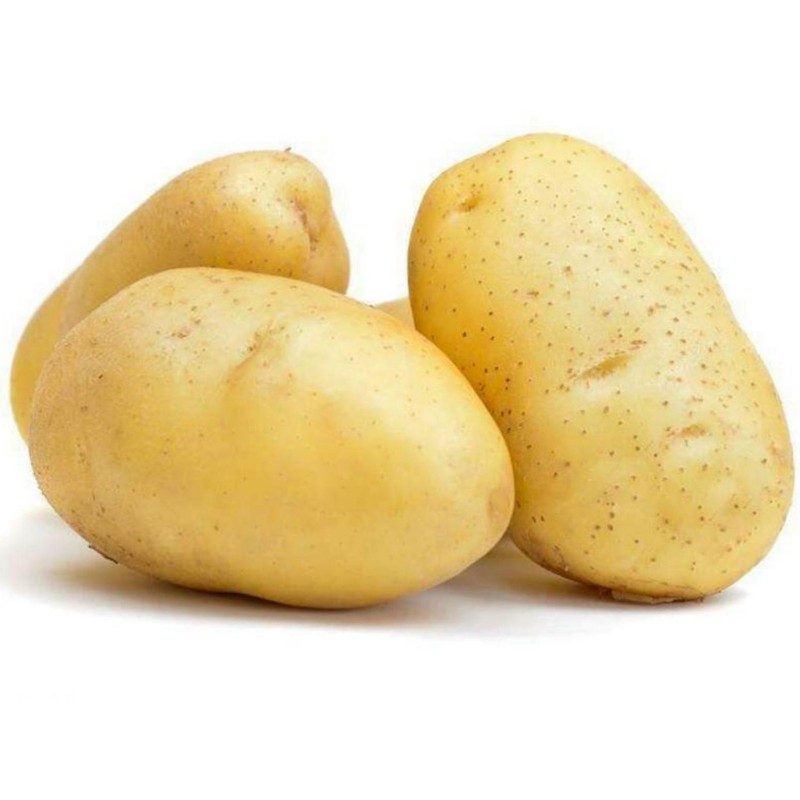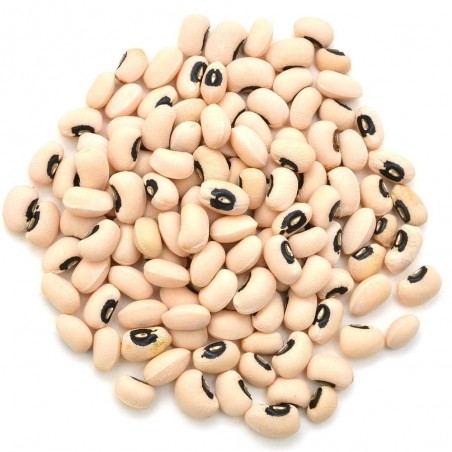
White Skin - White Flesh KENNEBEC Potato Seeds
White Skin - White Flesh KENNEBEC Potato Seeds
Price for Package of 10 seeds.
These white-skinned and white flesh tubers make excellent table potatoes. The fairly firm texture when boiled. They are highly recommended for fries and chips. Plants are compact and
White Skin - White Flesh KENNEBEC Potato Seeds
Price for Package of 10 seeds.
These white-skinned and white flesh tubers make excellent table potatoes. The fairly firm texture when boiled. They are highly recommended for fries and chips. Plants are compact and erect with pointed smooth leaves and; numerous big white flowers with slight reddish-purple tinge on backs.
Potatoes can be grown from true seeds just as easily and reliably as tomatoes, peppers or eggplants. True potato seed is a new development offering the advantages of, lower cost than mini-tubers, completely disease-free, and always available at the right planting time for gardeners in any region. This is the new wave in potato culture.
Start indoors in seedling trays. Fill each cell to 1cm (1/2") from the top with sterilized seed starting mix. Moisten with water and place one seed on the top of the soil per cell. Cover with vermiculite and water in. Note: Potato seeds require light to germinate, so do not bury. Optimal soil temperature for germination: 15-27°C (65-80°F). Seeds should germinate in 6-10 days.
Starting
Keep the soil evenly moist during germination, but allow free drainage so that excess water does not collect. Water before mid-day to allow foliage to dry completely by nightfall. Potato seedlings tend to stay prostrate immediately after emergence if they have 13 or more hours of daylight. As a somewhat longer stem is desired to ease transplanting, keep seedlings in about 12-hour light per day. During the last week expose seedlings to full sunlight to strengthen the stem. At optimal temperature, transplants will be ready 4 to 6 weeks after seeding.
If field conditions are very different from indoor conditions, allow one week of hardening off. Water the plugs heavily the day before and day of the transplant, and transplant into moist soil.
Growing
Ideal pH: 5.0-6.0. Plant seedlings so that only the crown of its top, 2-5cm (1-2“) is above soil level, burying the whole plug and a good part of the stem of the seedling. Seedlings cannot be completely buried, the growing point needs to stay above ground. Space seedlings 10-25cm (4-10") apart in rows 75cm (30") apart. Wider spacing produces fewer, but larger tubers. Keep the area well-watered for several weeks after transplant.
Hilling
When seedlings reach 10-15cm (4-6") in height, they should be hilled, probably three weeks after transplanting. This operation takes soil from the centre of the row, and covers the seedlings up to half of their height, creating a small hill. It is best to work from the centre of the furrow towards the plants. Do not cut too deep into the soil near the plant to avoid root damage. Just before hilling, fertilizer can be applied near the base of the seedlings, and this will be covered when hilling.
A second hilling and side dressing of balanced organic fertilizer should follow 3-4 weeks after the first, again depositing soil up to half the height of the plants. Again, increase the depth of the furrow in its centre and bring this soil on top of the small hill created in the first hilling operation.
Harvest
In the garden, potatoes can be harvested without destroying the plant if only a few potatoes are needed. Carefully scrape soil near the base of the stem until the skin of a potato is found, and pull it from the stolon. Consume it that day for a tasty and nutritious meal. If potatoes need to be stored for some time, remove the foliage 3 weeks before harvest. This "sets" (hardens) the skin, and it will store better as the thicker skin will reduce water loss from the tubers. Keep them dark up to 2 to 3 months at high humidity before eating.
Seed Info
In optimal conditions, at least 75% of the seeds will germinate. Usual seed life: 3 years. Per 100′ row: 200 seeds, per acre: 8.8M seeds.
Diseases & Pests
Protect from cabbage moths and other insect pests with floating row cover. Prevent disease with a strict 4-year crop rotation, avoiding planting Brassicas in the same spot more than once every four years.
Companion Planting
A worthy companion for beets, Brassicas, cucumbers, and onions. Avoid planting near peppers, pole beans, strawberries, and tomatoes.
| HEIRLOOM ? | Yes |
|---|---|
| Organic Seeds ? | Organic Seeds |
| Organic/natural ? | Organic/Natural: Yes |
| Sowing depth ? | Sowing depth 5 mm |
| Válogatott magok? | Válogatott magvak |
| Plant is suitable for growing ? | The plant is suitable for growing in a greenhouse The plant is suitable for growing on a balcony-terrace The plant is suitable for outdoors cultivation |
| Suitable for growing in flower pot ? | Suitable for pot: Yes |
| Origin Country of Variety ? | Variety from: USA |
| Seeds Gallery recommend this plant ? | Seeds Gallery recommend this plant! |


Your review appreciation cannot be sent
Report comment
Report sent
Your report cannot be sent
Írd meg véleményedet
Review sent
Your review cannot be sent
🌍 Globális szállítás az EU-ból
Világszerte szállítunk az Európai Unióból ajánlott küldeményként, átvételi visszaigazolással.
📦 Csomagkövetés
A csomagod követéséhez jelentkezz be a fiókodba, majd menj a Rendeléstörténet > Részletek menüpontra, ahol megtalálod a követési számot.
Nemzetközi követés: 17Track
RGxxxxxxHR típusú számok esetén: Posta.hr követés
🕒 Kérjük, várj legalább 24 órát a feladás után, hogy a követési adatok elérhetővé váljanak.
⚠️ Fontos tudnivalók
Utánvét nem elérhető.
Rendszeresen ellenőrizd a spam vagy kéretlen mappát az e-mail fiókodban az értesítésekért.
Kérjük, kizárólag a weboldalunkon található kapcsolati űrlapot használd.
Közvetlen e-mailekre nem biztos, hogy válaszolunk.
📱 Telefonszám megadása kötelező
Rendeléskor kötelező megadni a mobiltelefonszámodat az országkóddal együtt.
Példa: +36 30 123 4567
🚚 Szállítási feltételek
A nyomon követett csomag átvételekor átvételi aláírás szükséges.
Ne rendelj, ha:
postafiókba szeretnéd a csomagot
nem leszel otthon a kézbesítéskor
a csomagot a szomszédnak szeretnéd átadni (❌ ez nem lehetséges)
📬 Ha postafiók címet adsz meg, és a csomag elveszik, nem jár visszatérítés.
↩️ Csomag visszaküldése és újraküldés
Ha bármilyen okból visszaküldik a csomagot:
Visszaküldési díjat kell fizetned: 2 €
Valamint az újraküldés költségét is
⏱ Késések és nyomon követés
Ha a csomag még mindig a feladónál szerepel a követésben, az azt jelenti, hogy úton van.
A legfrissebb információkért keresd meg a helyi postahivatalt a követési számmal.
Nem vagyunk postaszolgáltató, így a csomagot nem tudjuk helyetted követni.
Nem vállalunk felelősséget a szállítás időtartamáért.
🔍 Eltűnt csomag ügyében vizsgálatot csak 30 nappal a feladás után indíthatunk.
✈️ Szállítási opciók
| Szállítás típusa | Feldolgozási idő | Biztosítás | Lehetséges késések | Megjegyzés |
|---|---|---|---|---|
| Standard | 7–10 munkanap | ❌ | 7–14 munkanap | Legolcsóbb opció |
| Prioritás | 1–7 munkanap | ❌ | 3–10 munkanap | Prioritásos feldolgozás – nem feltétlenül gyorsabb szállítás |
| Biztosított | 1–7 munkanap | ✅ | 3–10 munkanap | Visszatérítés elvesztés esetén (max. 150 € értékig) |
🕒 Várható szállítási idő:
Európai Unión belül: 3–20 munkanap
Világszerte: 5–30 munkanap
USA példák: 27, 22, 19, 17, 13 nap
💳 Fizetési módok
💶 Banki átutalás (SEPA / IBAN / SWIFT-BIC)
A fizetés leírásában kötelező megadni a rendelési számot (pl. SGS-19811702).
Ha hiányzik ez az adat, késedelmet vagy rendelés törlést okozhat.
Ha a befizetés nem érkezik meg 7 napon belül, a rendelést automatikusan töröljük.
🅿️ PayPal
Csak euróban történő fizetést fogadunk el PayPal-on keresztül.
Kérjük, a fizetéskor válaszd az eurót mint pénznemet.
💳 Bankkártyás fizetés
Kártyás fizetés a weboldalunkon keresztül: Exotic Seeds Store
Elfogadott kártyák: Visa, MasterCard, American Express, Diners Club, UnionPay, JCB, Discover stb.
💡 A vásárló viseli az esetleges tranzakciós díjakat.
Kérjük, küldd el a fizetés igazolását a gyorsabb feldolgozás érdekében.
📅 Egyéb információk
Hétvégén (szombat, vasárnap) nem dolgozunk fel rendeléseket és nem szállítunk.
Mindig olvasd el a fontos közleményeket a weboldalunkon (ünnepnapok, speciális feltételek stb.).
📫 Fontos:
Ne küldj közvetlen e-mailt nekünk. Csak a weboldalunkon lévő kapcsolati űrlapot használd.
Related Products















